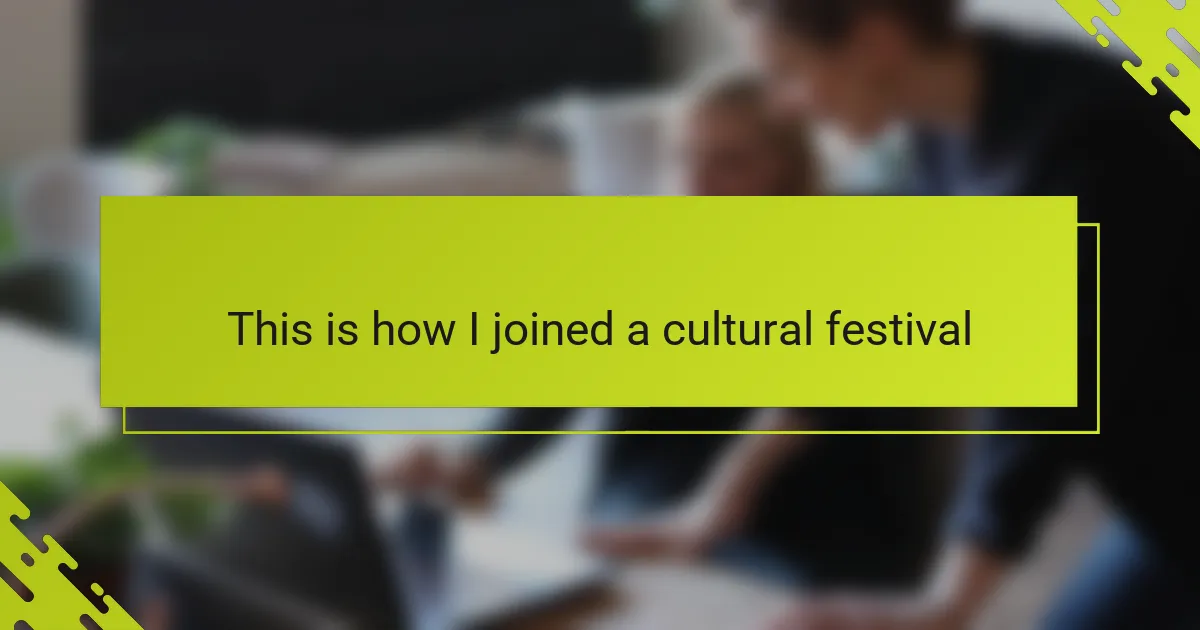Key takeaways
- Queer women culture celebrates diversity and authenticity, fostering connection through shared stories and experiences.
- Cultural festivals provide a safe space for expression, encouraging vulnerability and community through personal narratives and creative outlets.
- Finding queer women cultural events often relies on personal recommendations and grassroots organizations, creating intimate and welcoming gatherings.
- Preparation enhances the festival experience, allowing attendees to embrace their identity and engage more fully with the community.
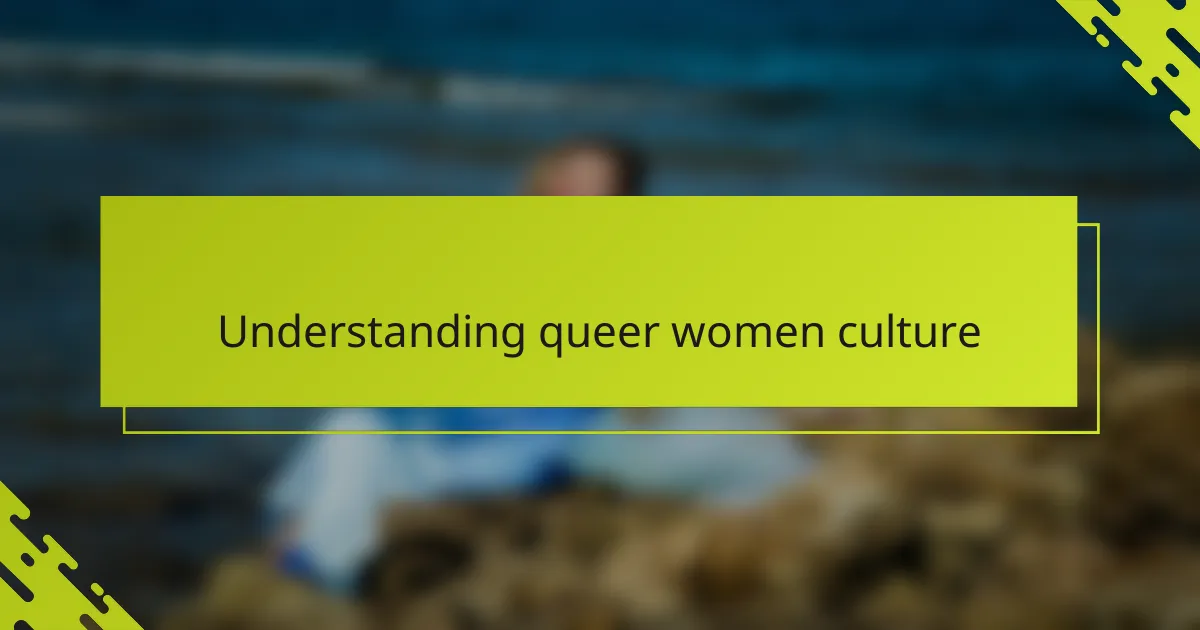
Understanding queer women culture
Understanding queer women culture means recognizing a rich tapestry of experiences shaped by identity, resilience, and creativity. I’ve found that it’s less about fitting into one box and more about embracing the fluidity and diversity that each person brings to the community. Have you ever noticed how a simple shared story or a favorite song can instantly create a profound connection among us?
From my experience, queer women culture thrives on the interplay of visibility and vulnerability. It encourages us to celebrate our truths while carving out spaces where authenticity isn’t just accepted but honored. What struck me the most is how these cultural moments—whether in art, language, or gatherings—become a lifeline, reminding us that we aren’t alone.
At its core, understanding this culture is about empathy and openness to stories that might differ from your own but still resonate deeply. I’ve seen how acknowledging each other’s journeys fosters stronger bonds and a collective spirit that fuels both activism and joy. Isn’t that what community is really about?
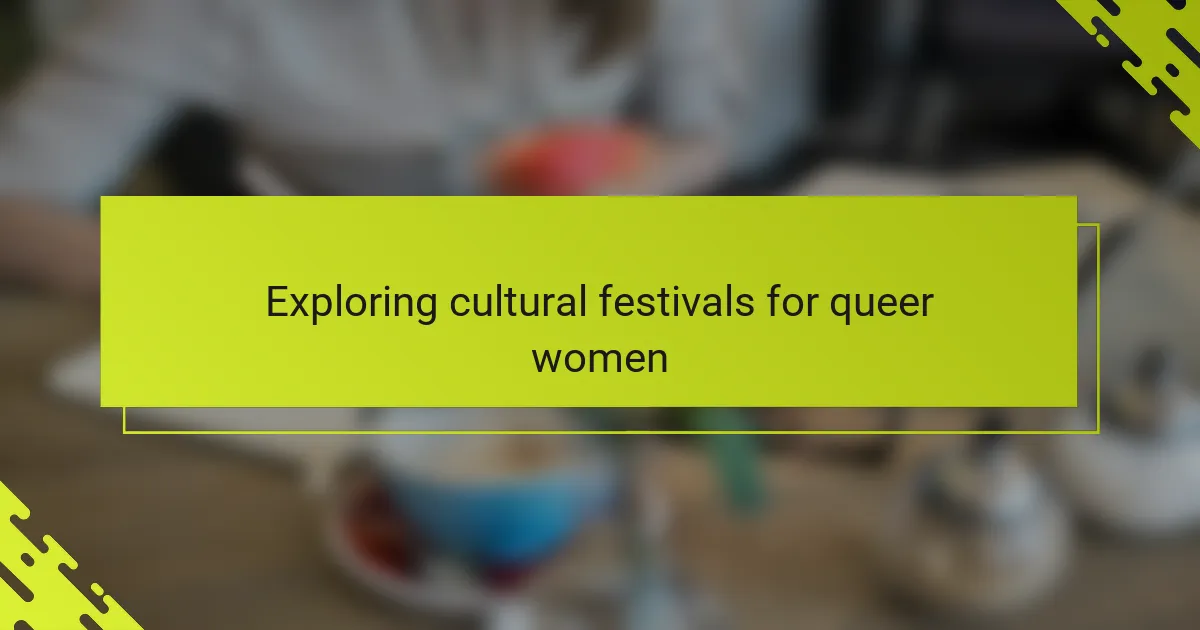
Exploring cultural festivals for queer women
When I first stepped into a cultural festival created for queer women, I was amazed by how the space felt like a mosaic of our diverse identities, stories, and expressions. It wasn’t just about the performances or art; it was about witnessing how each person’s uniqueness wove into a shared celebration of resilience and pride. Have you ever been somewhere and instantly felt understood without saying a word?
What I love about these festivals is how they create moments of pure connection. One time, I found myself chatting with someone who shared a song that had shaped her journey, and suddenly, it was like we were celebrating not just queer culture but the very essence of being seen and heard. These experiences remind me that cultural festivals aren’t just events—they’re powerful affirmations of community and self.
Exploring these gatherings has taught me that cultural festivals for queer women are spaces where vulnerability becomes strength. They invite us to honor our histories while embracing joy and creativity wholeheartedly. Have you ever wondered how such festivals could change the way you see your own story? For me, they opened up a world where I could truly be myself without hesitation.
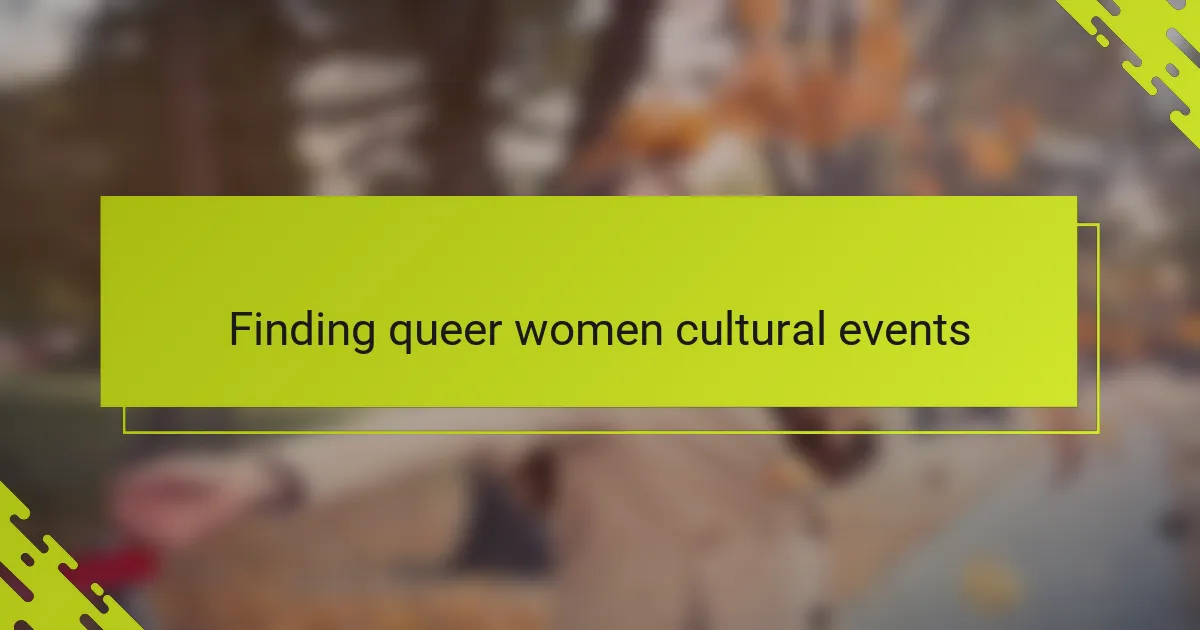
Finding queer women cultural events
Finding queer women cultural events often starts with a bit of online digging, but I’ve learned that the real gems usually come through word of mouth. Have you ever stumbled upon an event simply because a friend shared a flyer or a social media post that felt like it was made just for you? That moment of discovery can feel like uncovering a secret doorway into a space where you belong.
I remember my first experience trying to find such events was a mix of excitement and hesitation. I wasn’t sure if the spaces would feel welcoming or if I’d fit in. But once I attended, the warmth and authenticity were undeniable—it was like finding a community I hadn’t realized I was missing. Isn’t it amazing how one event can shift your entire sense of connection?
Another thing I’ve noticed is that many queer women cultural events are rooted in local communities, often organized by grassroots groups passionate about creating safe, celebratory environments. Have you ever thought about how attending these smaller, intimate gatherings can offer a deeper, more personal experience than larger festivals? In my opinion, those intimate settings often foster the strongest bonds and the most meaningful cultural exchange.
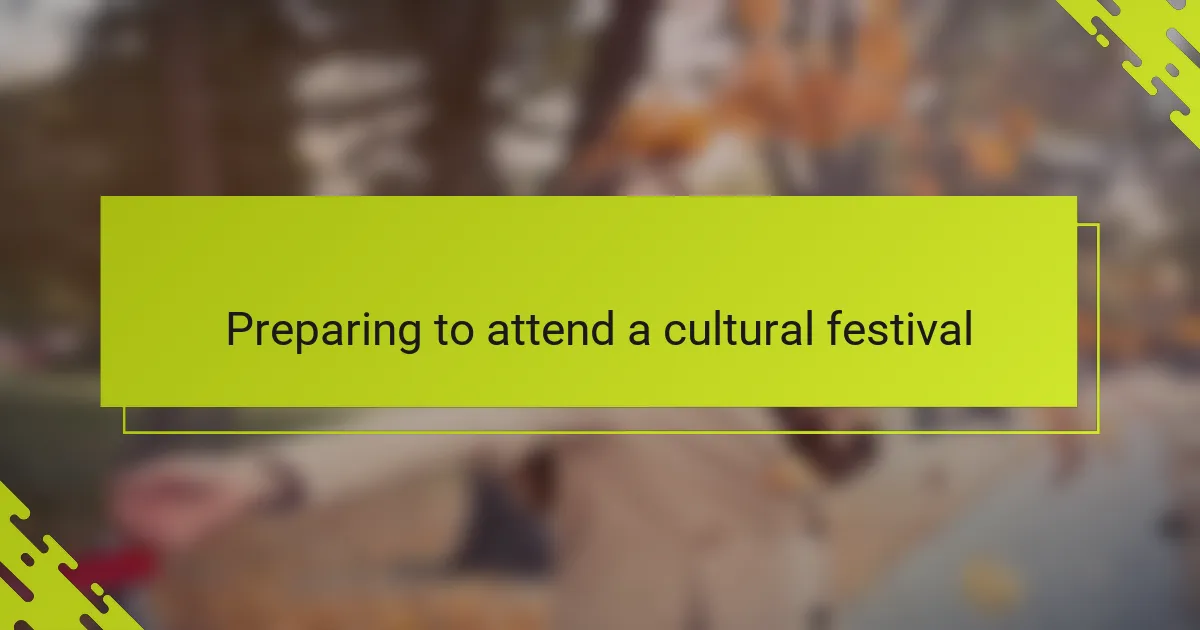
Preparing to attend a cultural festival
Before heading to the festival, I always make sure to give myself time to mentally prepare. There’s a certain excitement mixed with nerves, wondering who I’ll meet and what stories I’ll hear. Have you ever felt that buzz right before stepping into a place where you might finally feel at home?
Packing thoughtfully is part of the ritual for me. I bring comfortable clothes that help me express my identity freely, along with little personal touches—a favorite pin or a book that means something special. It’s amazing how these small things can boost your confidence and make the experience feel even more meaningful.
I also try to learn a bit about the festival ahead of time, checking out the schedule or any community guidelines. Knowing what to expect helps me settle in more easily and fully embrace the moments of connection and celebration. Have you noticed how preparation can turn apprehension into anticipation? That shift makes all the difference.
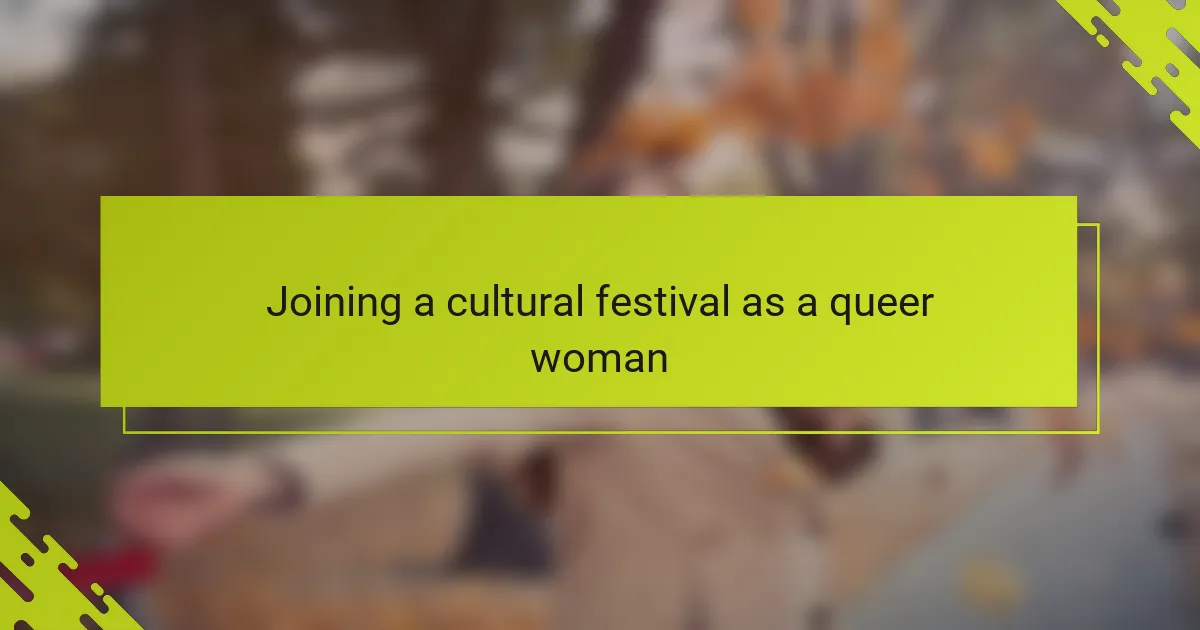
Joining a cultural festival as a queer woman
Joining a cultural festival as a queer woman often feels like stepping into a space that honors all parts of your identity simultaneously. I remember the first time I arrived, feeling both nervous and exhilarated because I wasn’t sure how my queer identity would be received amid cultural traditions. Have you ever experienced that moment when your fears melt away because the community’s warmth instantly makes you feel seen?
What’s remarkable is how these festivals actively invite you to bring your whole self—not just your queerness but your culture, your stories, your style. At one event, I found myself sharing a dance that had personal meaning while others shared theirs, creating a bridge between our individual histories and collective celebration. Isn’t it powerful how participating in these rituals can transform you from a spectator to an essential thread in the festival’s vibrant tapestry?
Yet, joining isn’t always straightforward. Sometimes, it means navigating spaces where queer visibility is still emerging or finding subtle ways to express your identity within cultural norms. From my experience, the courage to show up authentically—even when it feels vulnerable—opens doors to deeper connections and a sense of belonging that’s worth every challenge. Have you noticed how those moments of vulnerability often turn into your strongest memories?
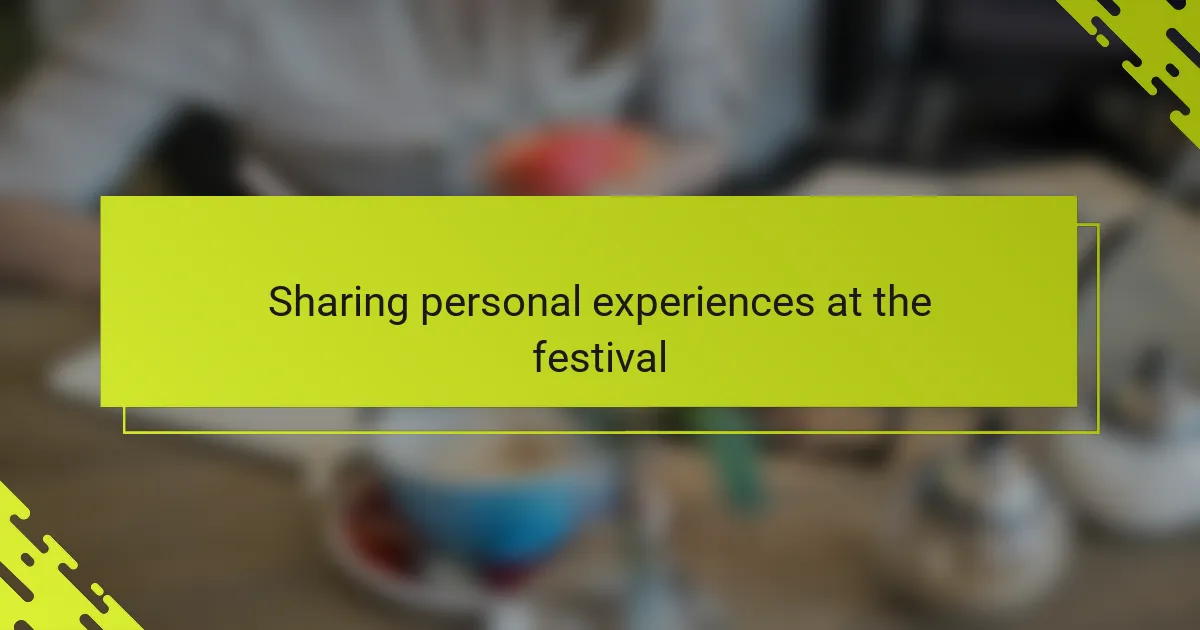
Sharing personal experiences at the festival
Sharing my personal experiences at the festival quickly taught me that storytelling is a powerful way to build connection. I remember nervously stepping up during an open-mic moment, unsure if my story would resonate, but the warm applause and nods from others showed me that vulnerability truly speaks louder than words. Have you ever felt that moment when sharing a piece of yourself leads to unexpected friendship?
The festival created a safe space for me to express not only my queer identity but also the cultural layers that shape who I am. I loved hearing others’ stories—some joyful, some painful—but all real and raw. These shared experiences forged a collective memory that felt more like a chosen family than just attendees at an event.
What struck me most was how the act of sharing became a ripple effect. One conversation would lead to another, and suddenly, personal narratives intertwined with music, art, and dance, enriching the celebration. Have you experienced a place where storytelling wasn’t just encouraged but celebrated as part of the culture itself? That, to me, is the heart of these festivals.
